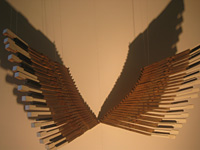Fine Arts
Description
|
The discipline of Fine Arts is intended for students who wish to involve themselves as practitioners in the visual arts or related fields. At UNSW, the study of this discipline is through the Faculty of Art and Design at Paddington.
Major areas of study within Fine Arts are: drawing, painting, printmaking, sculpture, installation, performance, photography, cross media and textiles. Drawing is a common language, which supports many disciplines within the college, and forms the basis of a general visual awareness. Drawing is the source, and result of a passionate response to the world, the origin of radical thought given birth by finding equivalents in line and mark. Painting allows you to work with painting as material process, object, concept and discourse, in order to develop as a painter within the context of contemporary art. Students will work from studio conventions to experimentation with contemporary approaches to painting. Beginning with themes such as materiality, technology, body, space, time and place, you will work towards developing your own areas of interest and focus. The Painting Stream prepares students to develop an independent and internationally focused professional contemporary fine arts practice. Printmaking focuses upon print media and is concerned with creativity through manipulation of the medium. Approaches which are examined in this area of study include digital imaging, etching, lithography, relief printing, screen-printing, photomechanical procedures, paper technology and various modes of delivery and presentation. Sculpture, Performance and Installation area of study is a stimulating community of creative research and scholarship that aspires to excellence in the conception, production and presentation of contemporary art practices. Because contemporary Sculpture, Installation and Performance are often inter disciplinary and span a multitude of divergent practices, the program is inherently flexible, open to experimentation, and is tailored to accommodate each student's personal, creative direction. Photography is concerned with the issues of analogue and digital image production within the context of national and international contemporary visual arts practice and debate central to the development and production of artwork. Emphasis is placed on conceptual and practical investigations through specific projects designed to promote the acquisition of technical skills and foster critical individual interpretations in addition to conceptual and aesthetic development. Cross-Media Arts Arts utilises the potential of emerging media and technologies to develop innovative, contemporary, critical and reflective art and design practices. Students work with physical and digital materials, employing experimental and playful approaches to explore media through an active, embodied engagement with concepts, processes, events, and spaces. Students working in this Stream will be prepared to become leading creators and inventors across emerging and recognised intermedia art practices. Textiles students create innovative and contemporary textiles designs. They work with traditional and experimental materials, structures and new technologies. Students in Textiles understand contexts for designing; how to develop innovative concepts; the narrative role textiles play in reflecting and documenting contemporary society; and the social, sustainable, re-use and environmental issues associated with textiles practice.
Fine Arts can be studied as
|
|||||||||||||||||||||||||||||||||||||||||||||||










